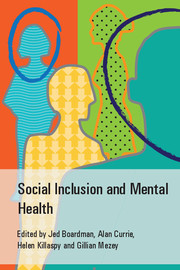Book contents
- Frontmatter
- Contents
- List of contributors
- List of tables, boxes and figures
- Foreword
- Preface
- Acknowledgements
- Scoping Group on Social Inclusion, Royal College of Psychiatrists
- Part 1 What is social exclusion?
- Part 2 Social exclusion: the scope of the problem
- Part 3 Working towards inclusive psychiatry
- 13 Social inclusion: research and evidence-based practice
- 14 Implications of social inclusion for individual practice
- 15 Socially inclusive mental health services: what will they look like?
- 16 Training for socially inclusive practice
- 17 Community mental health and the inclusion–exclusion seesaw
- 18 Socially inclusive practice and psychiatry in the 21st century
- Index
17 - Community mental health and the inclusion–exclusion seesaw
from Part 3 - Working towards inclusive psychiatry
Published online by Cambridge University Press: 01 January 2018
- Frontmatter
- Contents
- List of contributors
- List of tables, boxes and figures
- Foreword
- Preface
- Acknowledgements
- Scoping Group on Social Inclusion, Royal College of Psychiatrists
- Part 1 What is social exclusion?
- Part 2 Social exclusion: the scope of the problem
- Part 3 Working towards inclusive psychiatry
- 13 Social inclusion: research and evidence-based practice
- 14 Implications of social inclusion for individual practice
- 15 Socially inclusive mental health services: what will they look like?
- 16 Training for socially inclusive practice
- 17 Community mental health and the inclusion–exclusion seesaw
- 18 Socially inclusive practice and psychiatry in the 21st century
- Index
Summary
According to one definition of social exclusion, ‘An individual is socially excluded if he or she does not participate in key activities of the society in which he or she lives’ (Burchardt et al, 2002, p. 30). These key activities include education, employment, access to leisure facilities and civic participation. As this book documents, people who have mental illness are often excluded from some if not all of these activities. Those with the more severe forms of disorder are unlikely to be employed, more likely to reside in shared and subsidised accommodation, live in material poverty, rely on welfare benefits, and have restricted social networks and limited access to opportunities and leisure facilities in the community. Explaining this exclusion is tricky because it clearly arises in part from the nature of mental illness. Some of the more severe disorders begin in childhood and impair educational attainment that in turn limits occupational opportunity in adult life; people with depression withdraw from social contact and those with chronic schizophrenia neglect their environment. But clearly, as the term exclusion implies, much of the problem lies not with the mentally ill person but with the rest of us – how we structure society, the rules and regulations that facilitate access to education and employment, and how we go about organising assistance for the disadvantaged. Some mentally ill people, coming from a migrant group perceived as competing for jobs and resources or who are marginalised because they do not speak English or have a black skin, can have a double or triple whammy, as evidenced by the striking over-representation of some of these groups in coercive treatment settings (Bermingham et al, 1996; Coid et al, 2000; Audini & Lelliott, 2002).
How we organise care is itself confounded by our prejudices and beliefs about the capabilities of the mentally ill person and how much we generalise from observing a specific impairment to an assumption of global incompetence. On the one hand is the view that the affected individual is essentially powerless to change their state and the caring response is therefore one of doing ‘for’ the individual.
- Type
- Chapter
- Information
- Social Inclusion and Mental Health , pp. 345 - 358Publisher: Royal College of PsychiatristsPrint publication year: 2010



